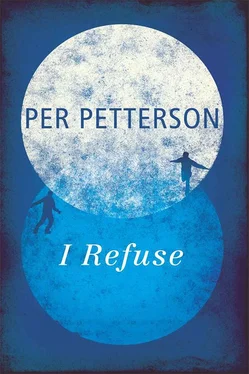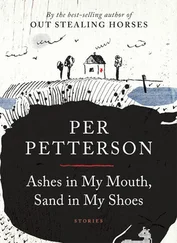‘Heavens above,’ he said, ‘it certainly was not. What was she supposed to do.’
‘Sit down,’ I said, and he sat down at once while I stayed on my feet. ‘She could have taken us with her,’ I said.
‘Four kids. On her own. Not bloody likely.’
He had been to sea for a few years when he was young, as so many others had around here, and had learned plenty of English expressions, but he rarely used them, he thought they sounded stupid, and he didn’t say ‘all hands on deck’or ‘shiver my timbers’ or any of that rubbish, either.
‘It wouldn’t have worked, you understand that, don’t you,’ Jonsen said.
‘I don’t understand a thing,’ I said.
‘No, of course not,’ he said. ‘It’s not your job to understand. It isn’t easy to understand. It became hell for all of you. I know. But you shouldn’t be bitter. You should put it behind you and forgive. Jesus, you’re over fifty now, how long are you going to keep it up,’ and on the tip of my tongue I had something ugly to say, something furry and nasty, and I must have looked that way, but I didn’t say it, and he grabbed the arm of the chair and hoisted himself up, and he did that because I was still standing. He said:
‘Have you started drinking, Tommy.’
‘Oh, hell, Jonsen,’ I said. ‘Why do you have to say something like that now.’ But he was right, I drank every night without exception, and then he fell to the floor, straight down, as if he didn’t have a bone in his body. I panicked, there was no one else around and I couldn’t remember what to do in a situation like this. I lifted him up by the shoulders and dragged him over to the sofa, but he was limp and heavy, and I carefully laid him down again and ran around opening drawers and cupboards, with no clue what I was looking for, a box of Paracet, perhaps, Paralgin forte or something for asthma, an inhaler, if he had one lying around, and then I realised how addled my brain was, I said, for Christ’s sake, Tommy, pull yourself together, and finally I got around to ringing the hospital.
They came in a helicopter shortly afterwards. I went up into the sky with them, I had never been in a helicopter before, and I held his hand as we flew through the air, and the sky wasn’t as blue up there as it was when you were down on the ground looking up, it was greyer, more indeterminate, more undefined, and his hand was clammy and lifeless and hadn’t held a hammer for a long time, nor a saw, not even something as small as a folding rule. I stroked his head and it felt so strange, for my palms didn’t know his head. The noise of the rotor blades was without mercy and to me it seemed that the helicopter was moving very slowly, slower than I had imagined, flying across the big lake, but then it finally landed on the helipad by the hospital, and they got him on to a stretcher in casualty, and standing there was a doctor I would meet a week later when I went to visit him straight from Gardemoen Airport, and two nurses came running down the long corridor at full speed with his bed between them, and one of them shouted to me, you can’t see him today, do you understand, come back tomorrow, and to be honest, that was fine with me, I had to go to Haugesund on a job.
The job took me a week or so, and when I was back, I caught the airport express to Lillestrøm and a taxi from the station, through the tunnel, right up to the big hospital, and now he was dead and his coffin lowered into the ground behind the white church in Mørk, and if he did refuse, he hadn’t refused hard enough.
JONSEN AND I sat by the kitchen window facing the road. It was dinnertime. From the window I could see the road right up from the bend and down into the neighbourhood and on past Jim and his mother’s house and even further, but I couldn’t see as far as the house where I used to live before. Not that it mattered. The house wasn’t there any more, it had burned down a week before this very day, at the end of May, and just knowing it made me feel light and airy in my stomach, a giddiness, helium, maybe, there was still the smell of smoke and ash all around.
We didn’t say much to each other. Often we didn’t. We didn’t have to, we knew each other well, we knew about each other. But what we talked about when we did talk, in the morning before leaving the house, was the work we were going to do at the sawmill that day. He was my boss. He had taken out a loan from Mørk Sparekasse and bought the whole business off the chronic drunkard Kallum, as a rescue operation, really, before it capsized and sank, and in fact it wasn’t that expensive, the bank turned out to be generous, and Jonsen gave me a full-time job at the mill, and I was happy about that. I was finished with school, I couldn’t stand another day of it, after secondary school it was over and out.
I was not yet eighteen but all the same we were two adults discussing orders and timber prices over the table every morning before leaving the house, and it was the two of us who worked out the runs to the bigger building sites or the runs to the smaller, maybe less accessible ones, like private houses, detached buildings, barns or garages, all sorts of places off the beaten track. And he was no different when he spoke to me about these matters than when he spoke with any other employee at the mill. There were three of them and much older than me. Jonsen had never had any children himself, and I think the way he talked to people and the language that he used was the same whether the person he spoke to was a child or a teenager or somebody well into his years. The difference didn’t even interest him. When he grew up there was no such thing as a teenager. You were a child, you were confirmed and then you were an adult and had to do your share and that was that.
Now we were both tired after a hard day’s work. Two men were off with the flu, and the following day we had a big delivery, so we didn’t say much over dinner and probably would have to go back for a few hours after Jonsen had had a nap.
I was chewing my food slowly and looking out through the window at the bend.
‘Here comes the police chief,’ I said. The familiar Volvo moved slowly down the road. Whoever was inside it was in no hurry. ‘Or the sergeant,’ I said.
Jonsen turned. ‘Yes, here he comes,’ Jonsen said. ‘What have you been up to now.’ He laughed.
‘Absolutely nothing,’ I said, and I laughed, too. ‘At least nothing I can remember. I’ve been on the straight and narrow, haven’t I,’ I said, and then I said: ‘Do we have to go back to the mill tonight.’
‘I think we do,’ Jonsen said. ‘Work’s piling up. And then we have to go to Eidsvoll with a full load tomorrow.’
‘I know,’ I said. ‘You take the sofa. I’ll take the floor.’
I liked lying on the floor. I always had. With my arms down by my sides and the hard floorboards against my shoulders and the back of my head, I was out for the count every single time. But I didn’t sleep for long. You couldn’t, of course.
Now I got up from the table with the empty plate in my hand and the cutlery and cast a glance through the window. I was about to turn and pile the washing-up on the worktop, and then I saw the car had stopped by our postbox. It was the sergeant. He opened the car door and lifted himself out with one hand on the door frame. He had put on weight. The skull belt hung beneath his belly now, where once it had been fastened tight across it, back when he had looked more like a sheriff. I hadn’t seen him in a while. Why would I.
‘He’s coming here,’ I said.
‘Well, I’ll be damned,’ Jonsen said. He stood up, placed his hands on the table, leaned forward and peered through the window, towards the postbox where the police car was parked, and the sergeant was already well on his way up to the house.
Читать дальше












